- Home
- A P Bateman
The Contract Man Page 2
The Contract Man Read online
Page 2
The overweight Kurd hesitated, staring disbelievingly at his wounded brother, then did as he was ordered. He got back into the Land Rover and quickly reversed it closer to where the Englishman was staggering over the scattering of rocks.
The second Kurd, who was tall and thin, especially in comparison to his companion, stood to the right firing continuously from the hip. The bullets sent clouds of dust and rock fragments into the air but had little effect on the advancing ISIS fighters who were now firing from prone positions high up in the rocky outcrop and getting their rounds dangerously close.
The Englishman eased the casualty into the rear of the open jeep, then picked up the AKS74 assault rifle from the rear seat, unfolded the metal shoulder-stock and held it firmly against his shoulder. He liked this weapon. It wasn’t as powerful as an AK47 but that meant that the recoil was less and the ease of aim was better for rapid shots. He flicked the selector switch down two clicks and fired single rounds in rapid succession towards the pattern of muzzle flashes which glittered away on top of the distant ridge.
Two fighters jumped up in unison and disappeared back over the ridge, very much aware that the bullets were becoming closer with every shot. The other two were set on staying and the man felt bullets tear through the air near him. He wasn’t going to stand and have a duel with them. He crouched low and ran to the Land Rover. The thin Kurd was still spraying the hillside with wild abandon. He fired the weapon dry than ran for the cover of the vehicle. He leapt up into the bed and changed the magazine then started firing again. The spent brass cases fell into the young Kurd’s face. The Englishman covered the wounded boy’s face, placed a comforting hand on his forehead. The overweight Kurd floored the accelerator and the vehicle slid sideways then gained traction as the tyres suddenly met with the potholed tarmac road surface.
Alex King shook his head in dismay as he took his hand off of the dead Kurd’s forehead. He had suspected that shock would finally take the boy, but dying in the back of a Land Rover with friends was better than dying at the hands of the vicious and sadistic ISIS terrorists. He said nothing to the youth’s jubilant brothers, they had earned the right of a little celebration. Instead, he placed the assault rifle on the bench seat beside him, took out the silk print map from his jacket pocket and quietly started to plot his escape.
2
The hallway was dark. A security light would occasionally light up the car park outside, in turn illuminating inside the building a little. Enough to make his work easier. The man carefully applied the adhesive tape to the highly polished brass plate of the door handle. It was a vaguely sticky yellow tape used by decorators when painting. Easy to apply and easier to remove without any adhesive residue. The tape covered the plate completely skirting the keyhole. With the protective barrier between the bright metal and his picklock he carefully inserted the tool into the lock confident of leaving no telltale scratch marks.
His companion held the torch for him keeping the red-filtered beam trained steadily on the opening of the lock. For now though it was only feel which mattered. He eased the pick into position, gently holding the gate in place before inserting the larger, titanium-tipped key. He worked the lock delicately, sensing the contour of the mechanism. He was an experienced locksmith, yet still he practiced on a number of locks each week. It was a skill that required constant honing. Finally, he eased the gate a complete turn to the right. With a smile which beamed satisfaction bordering upon relief, he glanced up at his colleague and nodded.
“We’re in!”
“Right, keep to the plan. You check for a safe and I’ll do the filing cabinets.” The second man nodded and flashed the red beam efficiently over the oak paneled walls of the tidy office. He was searching for the most probable place for a safe to be concealed.
A solicitor’s office is a working office. Files, documents or even evidence must be kept secure, but also it should be easily attainable. However, the documents they sought were dormant files. Placed with the law firm for security. They would be secure and out of the way of the day to day affairs. This aided their search. Such was the material matter that the two men felt confident that secretaries would not by chance happen upon it. They had already searched the solicitor’s house over a period of three separate days, timed during school time and within the busy gym, lunch and coffee sessions of the solicitor’s wife.
What they had determined in the briefing sessions was the documents would be held in a private safe. They had no reason to be believe, nor evidence of offsite security storage being used. Such was the thinking and motive behind the storage of the documents that a third party would be required as intermediary.
Ahead of him on the wall and between two ornate brass wall sconces, a large landscape oil painting was the central feature. It was the most obvious, possibly cliché location, but it also seemed to be the most probable. He walked around the imposing, mahogany desk, eased the leather chair aside, then gently felt around therim of the frame for any traces of an alarm system.
“Have you got something?” his companion asked, walking over and standing just a few feet from his shoulder.
“I’m not sure,” he paused, easing his fingers all the way around the gilt frame. “No alarm system, not that I can make out anyway.” He cautiously stepped around to the side of the painting and attempted to peer behind, using the pencil torch with its eerie red glow. “It’s fitted flush to the oak paneling, which is unusual.”
“If you say so.” His companion did not attempt to hide his impatience. “So, have you found something or not?”
He gently spread his arms out across the painting and caught hold of the two top corners then gradually eased the painting away from the wall. He turned and grinned at his colleague as the painting moved smoothly out, swinging gracefully on its custom-made hinges, revealing the metal safe door behind. “I would say so,” he replied somewhat smugly.
His colleague stepped forward and placed the small canvass bag on the mahogany desk. “Right, you go downstairs and start preparing the alarm system for reactivation while I get this unlocked.”
“No. Have you forgotten?” he paused, shaking his head defiantly at the man who was technically his superior. “Two to confirm.”
The man grit his teeth, relenting under duress. “Very well,” he paused, trying to reassert some authority. “Get the tools out for me. And this time, hold the torch steady.”
3
“I suppose all in all, it wasn’t a complete shambles.” Donald McCullum looked at the three men in turn, then turned his eyes back to the front page of The Times. “There isn’t a direct finger pointed at us, it could well have been anybody.” He dropped the paper on to the pile of broadsheets and tabloids, all with similar headlines and looked up expectantly for a reply. It was not long in coming.
“That’s as maybe, but the fact remains, a specialised piece of NATO equipment was left at the scene.” Martin Andrews smirked. “The whole idea was to make the job look Russian funded. Right down to the discarded rifle and the second rate ammunition. Thanks to your man, the whole illusion has been shattered. I understand he used match grade bullets?” He shook his head. “No, he disregarded the briefing. The Russians want a pipeline out of the Caspian through Iran, Iraq and into Turkey – the gateway to the west. These ISIS idiots are ruining their plans and it was as good a time as any to throw some mud on their faces. I mean, look at the Ukraine. We were caught napping there, as was the rest of the world. We had a chance to systematically remove known terrorists by assassination and point a finger at the Russians, leaving them with the reprisals to follow.”
“Our transatlantic friends are simply livid,” Marcus Arnott paused, noting an apparent flaw in his manicure. “To be honest, we can’t blame them. Nor can we expect them to sit back and await terrorist attacks on their own soil. They don’t want tit-for-tat. They will pick their targets but they will be big, like Osama Bin Laden or Saddam. Or they’ll do it just before an election…”
McCullum sh
ook his head. “They were all too quick to suggest that Colonel Al-Muqtadir be eliminated. All too pleased that we agreed to take care of it. And we did, Al-Muqtadir is out of the picture, well and truly.” The Deputy Director for Foreign Operations sat back in his leather chair and picked up his cup of tea he sipped thoughtfully. “With the elimination of Colonel Al-Muqtadir went the very real threat of ISIS building a permanent foothold in Northern Iraq, like they did with Syria. We proved the Iraqi colonel was imbedded with the terrorist organisation. The Iraqi government has moved troops further into insurgent territory and we’ve sent a clear message that the west will not tolerate fraternisation with terrorists.”
Martin Andrews shifted uncomfortably in his seat, becoming somewhat irritated with his colleague and technical equal. “Nobody is denying that, with Colonel Al-Muqtadir’s death, the building of an ISIS stronghold has come to an end. Or is at least stalled. What we all have a problem with, is the fact that your agent messed things up! For reasons best known to himself he let an untrained Kurdish rebel take the bloody shot!” he paused, just long enough for his words to sink in. “Here we have a man, a highly trained, highly motivated individual with fifteen years operational experience, letting a boy do the job for him. What in God’s name was he thinking?”
“In all honesty, I think Alex King should be recommended for psychological assessment.” Arnott looked at everyone in turn then frowned when they failed to react as he had expected. “Come on, the man must be completely deranged!”
“You’d be amazed how different life can be can be in the field, Marcus.” Peter Stewart, who had been silent until now, leaned forward and picked the copy of The Times up off the desk. “Alex King is a damned good agent, I should know, I helped train him.”
The three men remained silent. Peter Stewart was a listener, a tough, no nonsense Scotsman who spoke little, but when he did, everybody tended to take notice. Recruited by MI6 two decades ago from the SAS, and as head of the Operational Training Wing, he was certainly more qualified to talk about life in the field than anyone else.
“If Alex King wanted to let the Kurd take the shot, then I believe that he had a good reason, but until I have questioned him about the incident, nobody makes damned fool remarks about psychological assessment…” He turned his solid frame towards Arnott and held a cold, hard stare. “Understand?”
Marcus Arnott looked away, apparently having discovered another blemish on his fingernail. He turned his attention back to Donald McCullum, blanking Stewart, who sat to his left. “If you don’t mind me asking, what was the damning evidence that King left behind?”
“A navigational aid called an NGS1. Based on a Magellan, only NATO designed and developed.” McCullum shook his head despondently. “It was in his kit bag.”
“Magellan?” Arnott inquired, somewhat baffled.
Stewart coughed quietly, then looked at Marcus Arnott with glee. “A Magellan GPS. Global Positioning System. It’s a hand-held piece of equipment which relays your position to three separate satellites, then sends your exact fix back to you. This NATO developed version has extra features and can relay off jet liners and other aircraft without them knowing. Takes reference points from their digital markers, their radio beacon signals. It can use mobile phone masts as well. Theoretically you can never be lost with one.”
Arnott ignored him, keeping his eyes on McCullum. “Then how did he manage to lose it?”
“It would seem that after the assassination, the Kurd helping King was fatally wounded. Before he died, King tended to the man’s wounds, but Al-Muqtadir’s bodyguards and ISIS fighters got too close, King was forced to flee, leaving his kit bag behind,” McCullum paused. “The Kurd was part of the liaison team that the CIA set up six months ago, for just such missions. Enthusiastic rebels on the payroll, but lending deniability.”
“And as a result of tending to this boy’s wounds, Iraq now know that it was a British operation,” Arnott stated flatly. “As do the Russians and Islamic State terrorists. As do the entire world’s press, evidently.”
“No. As I said earlier, I beg to differ. They know that it was most probably an operation funded by the West.” McCullum looked at his understudy defiantly. “They do not know for sure that it was Britain. The Yanks do, but won’t tell tales on us. Not yet, at least.”
Andrews chuckled sardonically. “No Donald, but ISIS have guessed correctly and have threatened out-and-out terrorism to Britain as a result. The Russians are putting pressure on America to volunteer any information they may have.”
“Very well!” McCullum held his hands up in a gesture of mock submission.“If the department needs a head for the chopping block, then let it be mine that rolls!”
Andrews shook his head. “Nobody wants your head Donald. You’re in line for the top job, we all know that. But I think that we might all be better placed if we can come up with a suitable solution, and fast,” he paused, looking at the other two men. “The directive was put to us, and we reacted. Donald and I both agreed that Colonel Al-Muqtadir was a valid target. As is the way things go, Donald was the one who signed off on the executive order. Had it been myself, then you two would be seated in my office, albeit served with a superior brand of Cognac and not dishwater tea,” he smiled, trying his best to ease the tense atmosphere. “Marcus, you were invited here because of ISIS’s recent threat of a blanket of fire as they so theatrically put it. As head of domestic terrorism, we wondered what your views on that threat may be.”
Arnott sat back in his seat and shrugged his shoulders. “As regards to deterring terrorism on our own soil, that’s still Five’s main directive. All my department can offer is intelligence from overseas, possible links with other organisations et cetera. If the threat is deemed to be real, then we can liaise with MI5 and Special Branch and offer them intelligence from our various contacts. The newly formed Joint Intelligence Group is where we’re putting most of our data these days. Information is better than it was, but nobody likes sharing at the very beginning of their operations. Other than that, my department cannot really make a move at this end without stepping on other people’s toes.”
Andrews nodded, understanding the need for protocol. He also recognised someone playing a long game. Marcus Arnott was distancing himself from MI5 as much as he could. The new protocols were not that effective. However, with the situation as it was, SIS, or MI6 as it is more commonly known, could not afford any more embarrassments. He turned his attention to Peter Stewart who, characteristically, had remained patiently silent. “Peter, you were actively involved in training Alex King. In your opinion, was he one of the best men for the job?”
The big Scotsman eased his solid frame forward in his chair and methodically replaced the newspaper on the desk before picking up the thin china mug containing the cool remnants of his tea. “Aye, well.” He sipped some of the liquid then replaced the cup to the leather coaster. “To tell you the truth, at that level of operative there is barely a trait which separates them. At present, SIS have ten agents who are trained to mono-tactical level. That is to say, suitable for high-risk solo operations. When we require larger logistics, we make good use of the SAS or SBS.”
“Yes, yes. I know the situation,” Andrews replied impatiently. “But was Alex King the best man for the task?”
Stewart frowned. “As I said, there is barely a discernible difference between the current agents. It would be extremely difficult, probably foolhardy, to choose between them. They are all trained to the same exacting standards, any one of them would have been deemed suitable.”
Donald McCullum coughed quietly and smiled at the big Scotsman. “Peter, we all know the official line concerning the evaluation of Special-OPS agents, but off the level, was King the best agent that we could have sent?”
Stewart leaned back into the leather chair and looked at each of the men in tum. “Of the ten agents that form the current Special-OPS Unit, King is rated equally within the top three. That is to say, each man has his good and bad days. H
owever, over the past five years, King has performed the highest percentage of successful operations. Of course, he doesn’t know that. It wouldn’t pay if an agent suddenly started to have delusions of grandeur. What King has though is experience. Typically field agents are aged from twenty-seven to thirty-five. That’s the best balance of fitness, stamina and durability as well as valuable life experience and tactical decision making skills. King is our oldest tactical agent at forty-two. He’s among the fittest though and passes all the regular mental agility tests.”
McCullum did his best to hide a triumphant smile. He turned to his equal number and shrugged. “What more could we do? We sent the best man that we had, we can’t be held responsible for the way an agent performs in the field.”
Andrews nodded thoughtfully, but looked dubiously at his colleague. “True, but the fact remains, we are leftin the middle of a most awkward situation, one which could easily escalate into an international crisis,” he paused, resting the cigar against the rim of the nearby ashtray. Like all government buildings there was a strict no smoking policy that was ignored at the higher levels. “What we need is a quick solution, one which ultimately takes the British SIS out of the equation. Tell me, what transpired from King’s debrief?”
Donald McCullum shook his head. “I have not had the opportunity to interview him, as yet,” he paused, holding up his handsin front of his face in a defensive gesture. “I had pressing business at the weekend, I didn’t get the report until yesterday.”
Andrews looked dumfounded at his colleague, wondering what could have been so important as to take priority over the official debrief of a high-priority field agent. He knew that McCullum was extending his social circle, both within the intelligence community and among politicians, it was McCullum’s chosen track for securing the Director General’s position when the current DG left his post early next year.

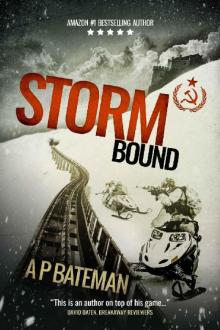 Stormbound
Stormbound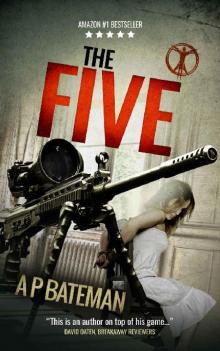 The Five
The Five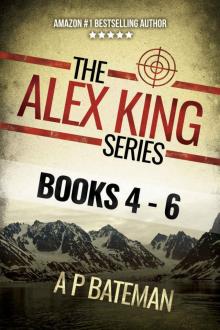 The Alex King Series
The Alex King Series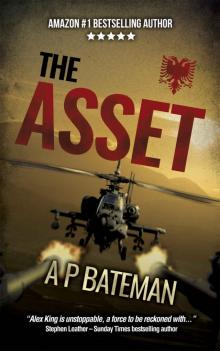 The Asset (Alex King Book 10)
The Asset (Alex King Book 10)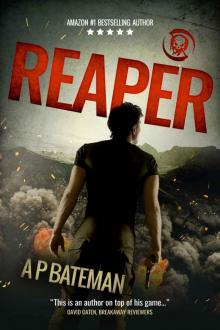 Reaper
Reaper Breakout
Breakout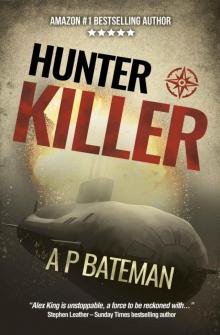 Hunter Killer - Alex King Series 12 (2021)
Hunter Killer - Alex King Series 12 (2021)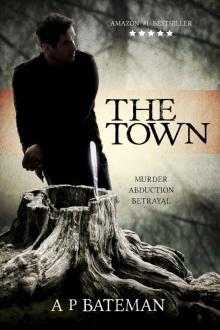 The Town (Rob Stone Book 2)
The Town (Rob Stone Book 2)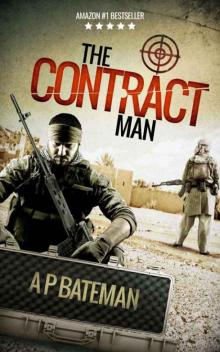 The Contract Man
The Contract Man The Island (Rob Stone Book 3)
The Island (Rob Stone Book 3)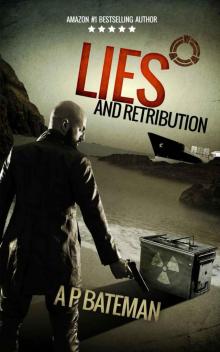 Lies and Retribution (Alex King Book 2)
Lies and Retribution (Alex King Book 2)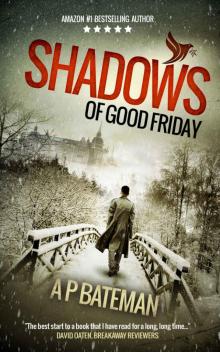 Shadows of Good Friday (Alex King Book 3)
Shadows of Good Friday (Alex King Book 3)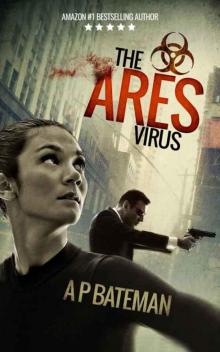 The Ares Virus
The Ares Virus